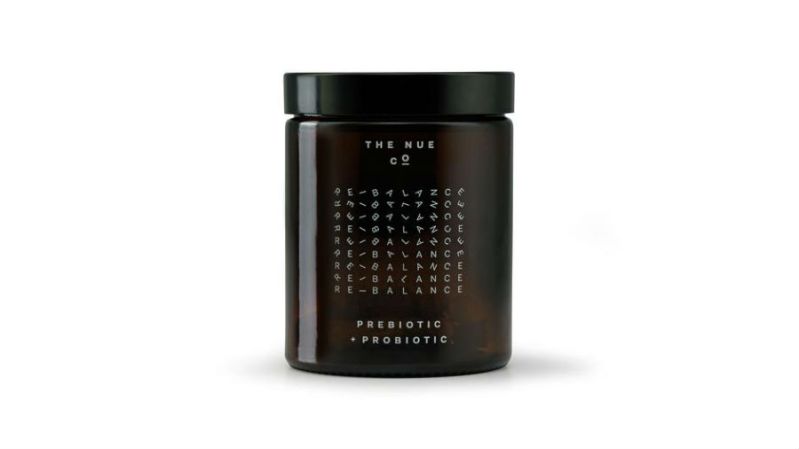Navigating the alphabet soup of the vitamin aisle can feel incredibly confusing. The general men’s supplement bottle is too generic, and the seemingly endless bottles of pills are so vague and nondescript in their packaging that it’s impossible to know which one(s) would benefit you the most. And then there’s that lingering question in the back of your mind: Do supplements even do anything?
Vitamins and Supplement According to Jules Miller

The world of vitamins is not very beginner-friendly, so in our quest for answers on all things supplements, we sat down with Jules Miller, founder of the luxury supplement brand The Nue Co. Miller is in a unique position to help us understand the truth, myths, and misconceptions behind vitamins and, lucky for us, she’s generous with her wisdom.
Vitamins are something of a family business for Miller, as her grandfather was part of the research team that discovered Vitamin B12 at Cambridge University. Now, with The Nue Co., Miller is elevating health supplements to the status of biological art using bio-available, highly absorbable organic foods to elevate long-term health.
“The supplement market is a confusing place that is increasingly hard to navigate, so our products are functional, simple, and easy to understand,” Miller tells The Manual.”
How Many Supplements Should Men Take?
Miller gets straight to the point with her first piece of insight: Supplements are not a buffet table. More isn’t always better, especially in this case. As the founder of a supplement company, her take is refreshingly honest.
“If you’re eating well and don’t have any major health concerns, then I’d argue you probably don’t need to be taking a ton of supplements,” she says. “I constantly meet people who are taking six to eight different supplements a day, which is totally counterproductive as they can begin to cancel each other out.
You don’t need to take a whole medicine cabinet’s worth of supplements every day. In fact, Miller believes this is the biggest misconception about supplements. A few targeted supplements will serve you better in the long run.
What’s The Best Supplement To Take?
If she had to pick just one supplement she recommends men take, it’s a probiotic or prebiotic blend for gut health. If you suffer from a sensitive stomach, this one addition to your daily routine could be a game-changer. The Nue Co.’s Prebiotic + Probiotic capsules, $85, delivers 15 billion spores per dose and was formulated specifically to help combat symptoms of IBS + long-term digestive issues.
“Our gut is as unique as a fingerprint, and an imbalance of good vs. bad bacteria can have a huge impact on overall health,” Miller says. “Put it like this: Around 85 percent of the body’s serotonin is created in the gut. If something is imbalanced there, you will feel it throughout the body.”
A happy gut leads to a happy life, apparently.

Are All Supplements Created Equal?
While Miller recommends the “less is more” approach to supplements, quality does matter. Some players in the vitamin industry do cut corners by filling their products with harmful additives and fillers. She suggests taking a long hard look at the back of the bottle before ingesting anything you might not fully understand.
“As a general rule, your off-the-shelf supplement will be about 50 percent active ingredients, and 50 percent will be synthetic fillers, bulking agents, and processed ingredients,” she warns. “Basically, nothing your body needs. Before taking any supplement or vitamin, look at each ingredient and ask yourself, “Would I eat this?” If the answer is no, don’t take it.”
How Do Supplements Fit In With My Diet?
Miller also makes it clear: Supplements are not a replacement for healthy whole foods. The best way to provide your body with the nutrients it needs to survive and thrive is through healthy choices and a good variety of fruits and vegetables in your diet. Vitamins are not a silver bullet.
“Synthetic and isolated vitamins go through vigorous processes, leaving us with an ingredient our body struggles to recognize, let alone draw benefit from,” says Miller. “That’s why we make our blends totally food-based. We take tried and tested vitamin formulations, but remove all unnecessary preservatives, bulking agents, fillers, and replace the synthetic actives with powerful organic foods.”
The Nue Co’s process results in a supplement that your body recognizes and that is easily digested and absorbed, so it can actually get to work in your body doing what it’s supposed to do.
How Much Should I Take?
In terms of dosage, finding the right amount that makes a meaningful difference without veering too far off toward the dangerous end of the spectrum can be tricky. Miller recommends a personalized approach.
“There isn’t a one-size-fits-all solution, so you should be taking supplements in accordance with the way you live your life — taking into account diet, overall well-being, and activity level,” she says. “For example, if you’re working out daily and looking to build muscle, you should be upping your protein intake.”

What Happens If I Skip A Day?
If you really want to see results from taking supplements, consistency is key. Miller says this is especially important when it comes to prebiotics and probiotics, as they have a cumulative effect.
Are Supplements Good For You?
Like anything you ingest, you should do your research and make sure it’s safe and effective. Even if you think you might be eating healthy, your supplements might contain things you wouldn’t consume otherwise. Miller has personal experience with being duped by the vitamin and supplement industry.
“When I developed [irritable bowl syndrome] in my mid-twenties, I tried to be careful with what I ate and started taking off-the-shelf supplements to treat my symptoms,” she says. “Quite quickly, I was taking five to eight different things a day and feeling awful off it. It was my grandfather who pointed out that whilst I avoided processed foods and sugar in my diet, I was still consuming all of them in my cocktail of supplements.”
She created The Nue Co. to be “the antithesis of the traditional supplement.” The Nue Co. prides itself on creating products are highly absorbable, nutrient-dense, natural, and most importantly, simple.
“We do not look or behave like a supplement brand, which is something that people really connect with,” she says. “We are out to prove that natural can be effective, sustainable can be luxurious, and that supplements can be aspirational.”
Editors' Recommendations
- Your guide to the pescatarian diet for healthier living
- The definitive guide on how to eat crab, according to an expert
- Try these 11 foods high in vitamin D for healthy bones
- Here are the benefits of taking vitamin D supplements – what you should know
- Did you know these popular foods are high in saturated fat?




